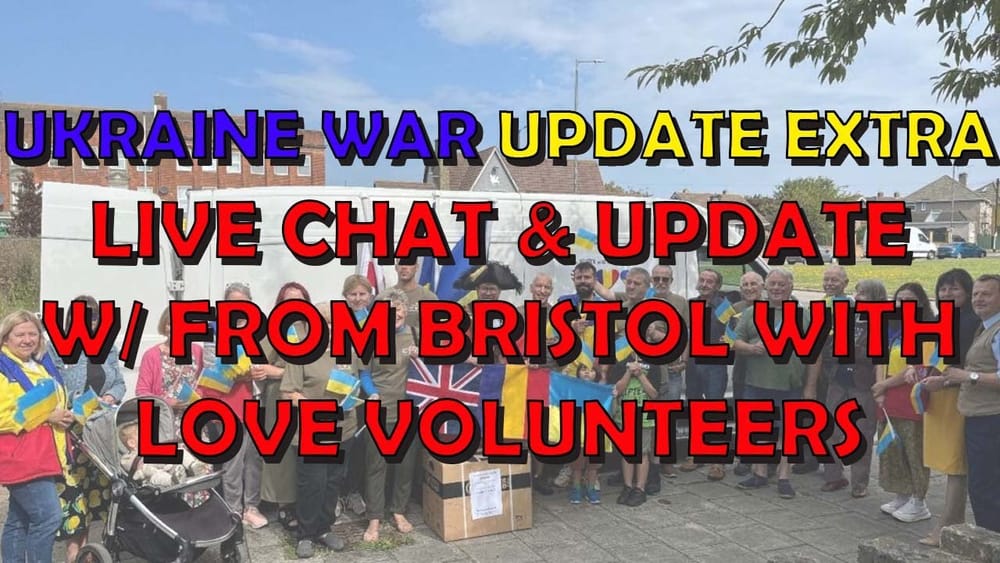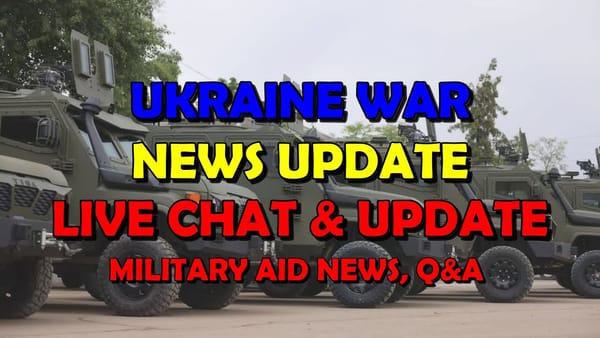Ukraine War Update Live Stream w/ From Bristol With Love
Table of Contents 📖
"It is madness that it's being perpetuated the way it is. We should be giving them the tools to do the job they need to do."
Hello Team
🎦 00:01-01:26⏩
- Jonathan introduces the live stream and welcomes guests from the charity "From Bristol With Love", Dan, Gary and Johnny.
- There are some audio issues because the guests are in the same room without headphones.
- Jonathan mentions a previous interview with the charity (two of the guests).
From Bristol With Love: Origins and Evolution
🎦 01:26-05:01⏩
- Gary explains how he got involved with the charity through his daughter's Duke of Edinburgh Award.
- He reached out to a group of friends, who immediately expressed interest in participating.
- The charity "From Bristol With Love" was originally founded by Romanian couple Razvan and Iuliana Konstantinescu to support Romanian orphanages.
- They expanded their efforts to aid Ukrainian refugees after the war began.
Aid Delivery Locations and Logistics
🎦 05:01-06:50⏩
- The group delivers aid to the Ukrainian border in Romania, primarily to Galats, Reni, and Izmail near the Danube River.
- They also deliver to Chernivtsi in the north and occasionally to Oradea in western Romania.
- Ukrainian refugees are sometimes given special permission to cross into Oradea due to its beauty.
- The aid handover point is a distribution centre staffed by Ukrainian trade union, military, and healthcare representatives, ensuring aid reaches those in need.
Types of Aid Delivered
🎦 06:50-08:51⏩
- The types of aid delivered are determined by requests from Ukrainians, ensuring their needs are met.
- Current requests prioritize formula milk due to mothers experiencing stress from the war impacting their milk production.
- Mobility aids were previously a primary focus due to the high number of amputees and reports of Russian forces confiscating them to strain Ukrainian infrastructure.
- Generators are a crucial item, with 10 being included in the upcoming trip.
Transparency and Feedback from End Users
🎦 08:51-09:33⏩
- Jonathan emphasizes the importance of transparency and feedback from the end users of aid.
- The charity receives photos and messages from Ukrainians expressing gratitude and showing the aid being used, providing confirmation of its impact.
Funding and Sustainability
🎦 09:33-11:51⏩
- The group raises funds to cover transportation costs for each trip, ensuring all charity funds go directly to aid.
- While initial fundraising was easier due to heightened public awareness, maintaining support requires more effort as the war continues.
- Supermarkets collections are crucial for raising both physical aid and funds, with recent collections yielding around 40 boxes of supplies.
- Jonathan commends the generosity of the public and acknowledges concerns about "war fatigue".
The Importance of Physical Donations
🎦 11:51-13:26⏩
- Jonathan acknowledges a previous viewer comment questioning the cost-effectiveness of transporting aid when purchasing it locally would be cheaper.
- He emphasizes the psychological impact of physical donations, fostering a connection between donors and recipients.
- The act of physically handing over goods and knowing they will directly benefit someone in need creates a powerful emotional connection.
- While the charity does purchase aid directly in Ukraine when possible, physical donations remain vital for donor engagement.
Leveraging Contacts for Efficient Aid Procurement
🎦 13:26-14:40⏩
- The charity has established contacts with suppliers and manufacturers, enabling them to secure goods like generators and medical supplies at significantly reduced prices.
- This approach maximizes the value of donations and ensures efficient use of transportation space.
- Jonathan notes that van space is often limited by weight restrictions, making lightweight, high-value items like medical supplies particularly valuable.
The Value of Transparency and Donor Engagement
🎦 14:40-15:29⏩
- Jonathan reiterates the importance of transparency in charity operations, emphasizing the positive feedback loop it creates.
- Transparency assures donors that their contributions are being used effectively, encouraging continued support and advocacy.
- The personal stories of those receiving aid, even small gestures like a chocolate bar reaching the front lines, strengthen the emotional connection for donors.
Anonymous Donors and "High-Information" Supporters
🎦 15:29-17:49⏩
- Jonathan highlights the contributions of "high-information" individuals who are deeply engaged with the war in Ukraine and actively support aid efforts.
- He expresses admiration for anonymous donors who prioritize the act of giving over receiving recognition, demonstrating genuine altruism.
- The discussion touches upon the natural human inclination to seek validation for good deeds and the challenge of practicing true selfless giving.
The Clarity of the Ukraine Conflict and War Fatigue
🎦 17:49-19:07⏩
- The guests and Jonathan agree that the Ukraine conflict is relatively straightforward in terms of identifying the aggressor and the victim.
- This clarity makes it easier to garner support compared to more complex conflicts where determining right and wrong is less clear-cut.
- Jonathan acknowledges concerns about war fatigue and the diminishing media attention given to the ongoing situation in Ukraine.
- He emphasizes that the conflict's importance hasn't diminished, and continued support is crucial.
Challenges in Aiding Other Conflicts
🎦 19:07-19:55⏩
- The group discusses the challenges in delivering aid to other conflicts, specifically mentioning the Palestinian situation.
- While acknowledging the importance of supporting various causes, they highlight the difficulties in ensuring aid reaches those in need in certain regions.
- The transparency and direct feedback received from Ukraine reinforce the effectiveness of their efforts, motivating their continued commitment.
The Power of Direct Connection and Gratitude
🎦 19:55-21:20⏩
- Jonathan emphasizes the significance of the direct connection between donors and recipients fostered by the charity.
- Donors can attach letters or notes to items like generators, creating a tangible link to the people they are helping.
- The group recounts the immense gratitude expressed by Ukrainians receiving aid, highlighting the emotional impact of their efforts.
- Johnny shares his experience of witnessing this firsthand during their first delivery to Chernivtsi, describing it as heartwarming and motivating.
The Frequency and Scale of Deliveries
🎦 21:20-22:58⏩
- The discussion clarifies that while this is the group's sixth trip, "From Bristol With Love" maintains a consistent flow of aid deliveries to Ukraine.
- They average at least one delivery per month, often multiple, with a minimum expenditure of £4,000 per month on aid.
- Deliveries can involve vans transporting donated goods or direct purchases of supplies in Ukraine.
- Jonathan accesses the charity's website to show viewers the delivery logs, highlighting the transparency and detailed information provided.
- Delivery number 73 is highlighted as the most recent one.
Engaging with Local Ukrainians in Bristol
🎦 22:58-24:18⏩
- Jonathan asks if the group has interacted with Ukrainian refugees in Bristol.
- They confirm they have several Ukrainian volunteers who assist with collections and packaging.
- Jonathan points out Bristol's location on a map, highlighting its significance as a starting point for their aid deliveries through the Channel Tunnel.
Transportation Costs and Support from Ferry and Rental Companies
🎦 24:18-25:36⏩
- Initially, major ferry companies and the Channel Tunnel provided free transit for the outward journey, which has since ended after two years.
- The group now raises additional funds to cover transportation costs both ways.
- Outbound journeys require freight transport due to the weight of the vans, while the return is done domestically with empty vans.
- Rental companies have provided significant support by offering discounted rates and flexibility with mileage limits, recognizing the charitable nature of the trips.
The Need for Drivers and Volunteers
🎦 25:36-27:49⏩
- The group emphasizes their ongoing need for drivers and volunteers to support aid deliveries.
- Potential drivers are expected to contribute towards trip funding as charity funds are reserved for aid purchases.
- Jonathan encourages viewers interested in participating to contact the charity, highlighting the rewarding experience it offers.
- He mentions individuals he knows who have expressed interest in getting involved.
- The discussion clarifies that drivers must be 25 years or older due to insurance stipulations.
Encountering Disinformation and Pro-Putin Sentiments
🎦 27:49-29:45⏩
- Jonathan inquires about the group's experiences with disinformation or pro-Putin views in the UK.
- Gary recounts encountering individuals who expressed support for Putin and struggled to understand the situation in Ukraine.
- Dan confirms similar experiences, highlighting the challenge of addressing deep-seated biases and misinformation.
- The conversation touches upon the prevalence of Russian propaganda and the persistence of certain narratives despite factual evidence.
- Jonathan discusses the psychological factors at play in shaping beliefs, emphasizing the importance of understanding why people believe what they do.
Psychology vs. Rationality in Belief Systems
🎦 29:45-30:51⏩
- Jonathan delves into the interplay of psychology and rationality in shaping people's worldviews.
- He shares his experience from years of philosophical debates, noting that psychological factors often play a greater role in belief formation than logic or reason.
- This realization highlights the need to address the underlying psychological motivations behind misinformation rather than simply presenting counter-arguments.
Meeting Ukrainians in Romania and Potential Future Visits
🎦 30:51-32:30⏩
- The group confirms they interact with Ukrainians who cross the border to collect aid.
- They've been invited for tea by a Ukrainian they've encountered multiple times, but insurance restrictions currently prevent them from accepting.
- Future plans include a potential coach trip organized by the charity to visit Ukraine, allowing them to experience the country firsthand.
- Jonathan seeks clarification on the correct pronunciation of "horilka", the Ukrainian word for vodka, highlighting the importance of respecting Ukrainian language and identity.
The Importance of Ukrainian Language and Terminology
🎦 32:30-33:30⏩
- The conversation emphasizes the significance of using Ukrainian spellings and terminology when discussing the conflict.
- Jonathan reflects on his initial resistance to using "Kyiv" instead of "Kiev", acknowledging the importance of adopting the Ukrainian pronunciation.
- He shares an anecdote about supermarkets changing the name of "chicken Kiev" to "chicken Kyiv" in solidarity with Ukraine.
- The group appreciates viewer corrections on language and pronunciation, recognizing the value of collective knowledge sharing.
Reflections on the War's Impact and Putin's Motivation
🎦 33:30-35:34⏩
- Jonathan asks the group for their thoughts on the war's progression.
- They express sadness and frustration, questioning Putin's motives and the lack of progress towards a resolution.
- Gary describes the situation as "depressing" and a "land grab", highlighting the stalemate and the continued loss of life on both sides.
Frustration with Western Response and the Need for Stronger Support
🎦 35:34-38:19⏩
- The group expresses frustration with the lack of decisive action from Western governments, particularly the Biden administration's reluctance to provide Ukraine with the necessary weapons to achieve a swift victory.
- Gary advocates for giving Ukraine the means to effectively defend itself, including the ability to strike Russian airfields.
- Jonathan criticizes the fear of escalation as a justification for restraining Ukraine's response, considering it a pathetic excuse while Russia commits atrocities.
- He argues that the West has a moral and strategic obligation to fully support Ukraine.
The Need to Highlight Russian Atrocities and Counter Disinformation
🎦 38:19-39:45⏩
- Jonathan emphasizes the need for greater media coverage of Russian atrocities in Ukraine, arguing that the public needs to be constantly reminded of the horrors of the war.
- He suggests showcasing raw footage of the destruction and highlighting evidence of systematic executions, rape, and murder committed by Russian forces.
- This, he believes, would counteract disinformation and reinforce the understanding of Russia as the aggressor.
- He asserts that the conflict's simplicity, with clear good and bad actors, should guide Western support for Ukraine.
- Jonathan suggests using more drone footage from destroyed Ukrainian cities to remind people of the reality of the war.
Strategic Interests and the Morality of Prolonging the War
🎦 39:45-42:10⏩
- The group challenges the notion that the West's strategic interests align with a prolonged war that grinds down Russia.
- They argue that the humanitarian imperative should prioritize ending the conflict as quickly as possible.
- Jonathan suggests the US might be strategically benefitting from the war's continuation, but questions the morality of sacrificing Ukrainian and Russian lives for this purpose.
- He underscores that a decisive Ukrainian victory is the most just and humane outcome.
- Daniel argues that a swift Ukrainian victory, achieved by providing them with the means to defeat Russia, is the best way to save lives.
The Budapest Memorandum and Western Obligations
🎦 42:10-43:19⏩
- Daniel raises the Budapest Memorandum, which guaranteed Ukraine's security in exchange for giving up its nuclear weapons.
- He criticizes the West, particularly Russia, France, and the US, for failing to fulfill their obligations under the agreement.
- Jonathan agrees, arguing that the current level of weapons and aid provided by the West only serves to prolong the war rather than enabling a swift Ukrainian victory.
Questioning US Restrictions and the Fear of Nuclear Escalation
🎦 43:19-45:00⏩
- Jonathan questions the logic behind US restrictions on Ukraine using Western-supplied weapons to strike targets within Russia.
- He highlights the inconsistency of allowing strikes on Crimea, which Russia claims as its own territory, while restricting strikes on other Russian regions.
- He argues that if Russia considers Crimea part of its sovereign territory, then the same logic should apply to other annexed regions, invalidating the argument for escalation.
- Jonathan asserts that Putin crossed the red line by invading Ukraine, and the West should not be bound by artificial restrictions on supporting Ukraine's self-defense.
The Impact of Russian Disinformation on Ordinary Citizens
🎦 45:00-48:32⏩
- The conversation shifts to the impact of Russian disinformation on ordinary citizens, both in Russia and abroad.
- The group acknowledges that many Russians are victims of state-controlled media and propaganda, preventing them from forming informed opinions about the war.
- They recount anecdotes about Russians facing imprisonment for even mentioning the word "war" or expressing anti-war sentiments, highlighting the oppressive environment within Russia.
- Jonathan expresses concern about the long-term challenge of deprogramming Russians from state propaganda even if there is a regime change.
- He highlights the systematic efforts to rewrite history and instill nationalist brainwashing in Russian education, creating a generational challenge for the future.
- Despite the complexities, the immediate focus, they agree, must be on stopping the war and supporting Ukraine.
The Need to Counter Russian Disinformation Efforts
🎦 48:32-50:32⏩
- Jonathan discusses the significant financial resources Russia invests in disinformation campaigns aimed at influencing global perceptions and interfering in elections.
- He laments the lack of effective countermeasures from Western governments, describing a defensive posture that allows Russian propaganda to spread unchecked.
- Jonathan suggests that focusing resources on combating disinformation could have been more impactful than the conventional war, as it would undermine Russia's ability to manipulate global narratives.
- He expresses frustration with the prevalence of disinformation on platforms like Twitter and advocates for alternative platforms like Blue Sky.
Updates on Aid Deliveries and the Impact of Generators
🎦 50:32-54:47⏩
- Gary provides an update on the charity's achievements, revealing that they have delivered 223 generators, 2 blood coagulators costing £10,000 each, and one ambulance.
- Jonathan expresses amazement at the scale of their efforts, highlighting the impact of even small donations in procuring essential supplies.
- The group discusses the importance of generators, particularly as winter approaches in Ukraine, emphasizing their ability to provide warmth and power during power outages.
- They share examples of how a single generator or a heated vest with a power bank can significantly improve the lives of Ukrainians struggling with the cold.
Recognition and Support from Local Authorities and Dignitaries
🎦 54:47-58:45⏩
- The group discusses the support they have received from local authorities and dignitaries in Bristol, acknowledging the contributions of individuals like the Lord Lieutenant, Lord Mayor, High Sheriff, and Councillor Brenda Massey.
- The Bristol City Council has provided the charity with premises and covered utility costs, enabling them to maximize the use of donations for aid.
- This support underscores the community's commitment to helping Ukraine and highlights the collective effort behind "From Bristol With Love".
The Character of Bristol and its Anti-Fascist Spirit
🎦 58:45-59:25⏩
- Jonathan inquires about the character of Bristol and its support for Ukraine, drawing a parallel with the city's history of anti-fascist activism.
- The group describes Bristolians as outspoken and willing to stand up for their beliefs, citing instances of peaceful protests against right-wing groups.
- They share an anecdote about Bristolians preventing a group of fascists from entering a hotel, demonstrating the city's commitment to opposing extremism.
- Ian Morris, a viewer, comments on the fantastic job the group is doing, stating that 15% of Ukraine's war effort comes from volunteers like them.
Wrap up
- Jonathan expresses his gratitude to the group for their work and encourages viewers to support "From Bristol With Love".
- He mentions an upcoming live stream with Stephen Bendham, a Norwegian individual married to a Ukrainian, who will provide insights from Kyiv.
- He also promotes future live streams with other guests, including Jake Brough, Greg Terry, and Erland and Daniela from Tocini, to discuss Italian aid to Ukraine.
- Jonathan thanks Richard Bennett for gifting five ATP Geopolitics memberships and acknowledges the active live chat participation.
- He concludes the stream with a "Slava Ukraini!" (Glory to Ukraine!) and thanks viewers for their support.
- The guests confirm their next trip is scheduled for a week Saturday.
- Jonathan encourages viewers to donate and consider volunteering as drivers.
- Jonathan thanks the guests and signs off, reminding viewers of upcoming live streams and thanking Richard Bennett for gifting memberships.




